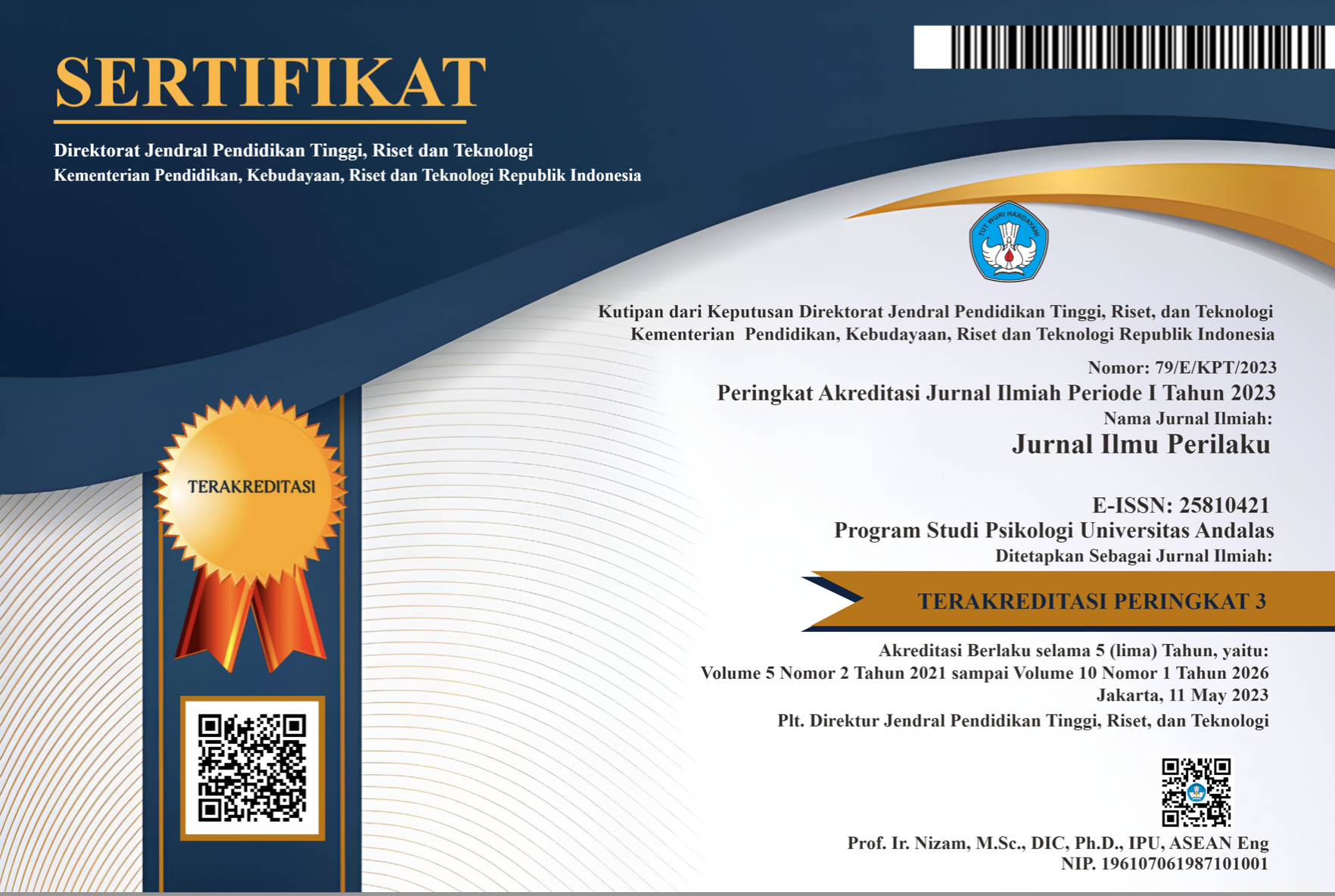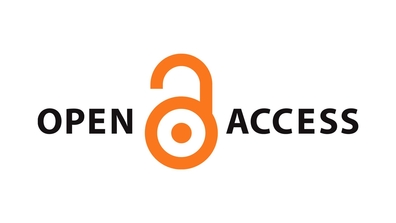Meaningful Workdan Komitmen terhadap Organisasi pada Dosen
Abstract
Meaningful work dan komitmen terhadap organisasi memberikan keuntungan tidak hanya bagi pekerja, tetapi juga bagi organisasi. Tujuan penelitian ini adalah untuk mengetahui hubungan antara meaningful work dan komitmen terhadap organisasi pada dosen di Universitas X, yaitu salah satu universitas swasta di Jakarta Barat. Hipotesis yang diajukan dalam penelitian ini adalah terdapat hubungan positif antara meaningful work dan komitmen terhadap organisasi pada dosen. Subjek dalam penelitian ini adalah 44 dosen yang bekerja di Universitas X. Metode penelitian ini adalah penelitian korelasional dengan pendekatan kuantitatif. Data diperoleh dengan menggunakan Skala Meaningful Work (Steger, Dik, & Duffy, 2012) yang telah diadaptasi oleh peneliti dan Skala Komitmen terhadap Organisasi (Meyer & Allen, 1990) yang telah diadaptasi oleh Moerkardjono dan Surya (2016). Hasil penelitian ini menunjukkan hubungan yang signifikan dan positif antara meaningful work dan komitmen terhadap organisasi pada dosen di Universitas X.
Downloads
References
American Journal of Industrial and Business Management, 5, 769-778.
Almaidah, S., & Wagiyem. (2014). Pengaruh komitmen terhadap organisasi, perilaku kerwargaan organisasional, dan etika kerja islami terhadap perubahan organisasi (Studi terhadap dosen perguruan tinggi swasta di Surakarta).
Riset Manajemen & Akuntansi, 5(10), 41-59.Amangala, T. A. (2013). The effect of demographic characteristics on organizational commitment: A study of salespersons in the soft drink industry in Nigeria. European Journal of Business and Management, 5(18), 109-118.
Azizah, S. N. (2014). Workplace spirituality and employee commitment: Penelitian empirik pada KPPS Syariah Kebumen. Jurnal Fokus Bisnis, 14(2), 107-117.
Blanca, G., & Ramona, T. (2017). What makes work meaningful. Studies in Business and Economics, 12(2), 46-52.
Beukes, I., & Botha, E. (2013). Organizational commitment, work engagement and meaning of work of nursing staff in hospitals. SA Journal of Industrial Psychology, 39(2), 1-10.Coetzee, M. (2005). Employee Commitment. The University of Pretoria, etd.
Geldenhuys, M., Laba, K., & Venter, C. M. (2014). Meaningful work, work engagement and organizational commitment. SA Journal of Industrial Psychology, 40(1), 1-10.
Harmen, H. & Amanah, D. (2013). Analisis model komitmen organisasi terhadap kinerja dosen Universitas Negeri Medan. Jurnal Keuangan & Bisnis, 5(3), 205-213.
Indartono, S., & Wulandari, S. Z. (2013). Moderation effect of gender on workplace spirituality and commitment relationship: the case of Indonesian ethics. Asian Journal of Business Ethics.
Jiang, L., & Johnson, M. J. (2017). Meaningful work and affective commitment: A moderated mediation model of positive work reflection and work centrality. Journal of Business & Psychology.
Jung, H. S., & Yoon, H. H. (2016). What does work meaning to hospitality employees? The effects of meaningful work on employees’ organizational commitment: The mediating role of job engagement. International Journal of Hospitality Management, 53, 59-68.
Kim, B., Nurunnabi, M., Kim, T., & Jung, S. (2018). The influence of corporate social responsibility on organizational commitment: The sequential mediating effect of meaningfulness of work and perceived organizational support. Sustainability, 10, 1-16.
Kónya, V., Matić, D., & Pavlović, J. (2016). The influence of demographic, job characteristics and characteristics of organizations on employee commitment. Acta Polytechnica Hungaria, 13(3), 119-138.
Luthans, F., Luthans, B. C., & Luthans, K. W. (2015). Organizational Behavior: An Evidance-Based Approach(13th edition). USA: Information Age Publishing, Inc.
Meyer, J. P., & Allen, N. J. (1990). The Measurement and Antecedents of Affective, Continuance, and Normative Commitment to the Organization. Journal of Occupational Psychology. 63,1-8
Meyer, J. P., & Allen, N. J. (1997). Commitment in the workplace. USA: Sage Publication.
Michaelson, C., Pratt, M. G., Grant, A. M., & Dunn, C. P. (2014). Meaningful work: Connecting business ethics and organization studies. Journal of Business Ethics, 121, 77-90.
Moerkardjono, S. R., & Surya. (2016). Kepuasan kerja, komitmen organisasi, keterlibatan kerja, afek, thriving dan work engagement sebagai prediktor bagi kebahagiaan kerja di tingkat universitas. Jurnal Psikologi Unsyiah, 4(8), 15-33.
Prabawati, I. N. (2017). Meaningful work dan work engagement terhadap komitmen organisasi pada relawan. Jurnal Psikologi, 10(1), 83-91.
Pradhan, S., & Pradhan, R. K. (2016). Transformational leadership and job outcomes: The mediating role of meaningful work. Global Business Review, 17(3S).
Rani, S., Agustiani, H., Ardiwinata, M. R., & Purwono, R. U. (2018, November). Work Engagement and Organizational Commitment in Private University.Paper dipresentasikan pada The 3rdInternational Conference on Psychology in Health, Educational, Social, and Organizational Settings, Surabaya, Indonesia.
Retta, M. (2016). Hubungan Keterlibatan Kerja dan Komitmen Organisasi pada Karyawan Universitas X. (Skripsi Tidak Dipublikasikan). Universitas Kristen Krida Wacana.
Steger, M. F., Dik, B. J., & Duffy, R. D. (2012). Measuring meaningful The work and meaning inventory (WAMI). Journal of Career Assessment, 0(0), 1-16.
Sulistiobudi, R. A., Kadiyono, A. L., & Batubara, M. (2017). Menemukan kesejahteraan psikologis dibalik profesi dosen: Psychological contract sebagai salah satu prediktor tercapainya psychological well being pada dosen. Humanitas, 14(2), 120-138.
Tavakoli, Z., Arsalani, M., Khoshknab, M. F., Shahriari, M., & Biglarian, A. (2016). The relation of the meaning of work with organizational commitment among nurses of Isfahan education and therapeutic centers. Journal of Chemical and Pharmaceutical Research, 8(2), 99-105.
Wahyuni, M. (2017). Pengaruh makna kerja dan occupational self efficacy terhadap work engagement pada dosen tetap. Jurnal Psikologi, 10(1), 39-47.
Wanjiku, K. P. (2016). Effect of intrinsic rewards on the commitment of employees at Kenya’s Fairmont Group of hotels. (Unpublished thesis).
The University of Nairobi.
Widyastuti, E., & Nugroho, Y. J. D. (2017). Komitmen organisasi ditinjau dari kepuasan kerja dan makna kerja. Jurnal Ilmiah Psikohumanika, 9(1), 37-49.
The non-commercial use of the article is governed by the Creative Commons Attribution license as currently displayed on Creative Commons Attribution-NonCommercial-ShareAlike 4.0 International License.
JIP's spirit is to disseminate articles published are as free as possible. Under the Creative Commons license, JIP permits users to copy, distribute, display, and perform the work for non-commercial purposes only. Users will also need to attribute authors and JIP on distributing works in the journal.
Please find the rights and licenses in Jurnal Ilmu Perilaku (JIP).
- License
The non-commercial use of the article will be governed by the Creative Commons Attribution license as currently displayed on Creative Commons Attribution-NonCommercial-ShareAlike 4.0 International License.
- Author’s Warranties
The author warrants that the article is original, written by stated author(s), has not been published before, contains no unlawful statements, does not infringe the rights of others, is subject to copyright that is vested exclusively in the author and free of any third party rights, and that any necessary written permissions to quote from other sources have been obtained by the author(s).
- User Rights
JIP's spirit is to disseminate articles published are as free as possible. Under the Creative Commons license, JIP permits users to copy, distribute, display, and perform the work for non-commercial purposes only. Users will also need to attribute authors and JIP on distributing works in the journal.
- Rights of Authors
Authors retain the following rights:
- Copyright, and other proprietary rights relating to the article, such as patent rights,
- The right to use the substance of the article in future own works, including lectures and books,
- The right to reproduce the article for own purposes, provided the copies are not offered for sale,
- The right to self-archive the article.
- Co-Authorship
If the article was jointly prepared by other authors, the signatory of this form warrants that he/she has been authorized by all co-authors to sign this agreement on their behalf, and agrees to inform his/her co-authors of the terms of this agreement.
- Termination
This agreement can be terminated by the author or JIP upon two months’ notice where the other party has materially breached this agreement and failed to remedy such breach within a month of being given the terminating party’s notice requesting such breach to be remedied. No breach or violation of this agreement will cause this agreement or any license granted in it to terminate automatically or affect the definition of JIP.
- Royalties
This agreement entitles the author to no royalties or other fees. To such extent as legally permissible, the author waives his or her right to collect royalties relative to the article in respect of any use of the article by JIP or its sublicensee.
- Miscellaneous
JIP will publish the article (or have it published) in the journal if the article’s editorial process is successfully completed and JIP or its sublicensee has become obligated to have the article published. JIP may conform the article to a style of punctuation, spelling, capitalization, referencing and usage that it deems appropriate. The author acknowledges that the article may be published so that it will be publicly accessible and such access will be free of charge for the readers.










